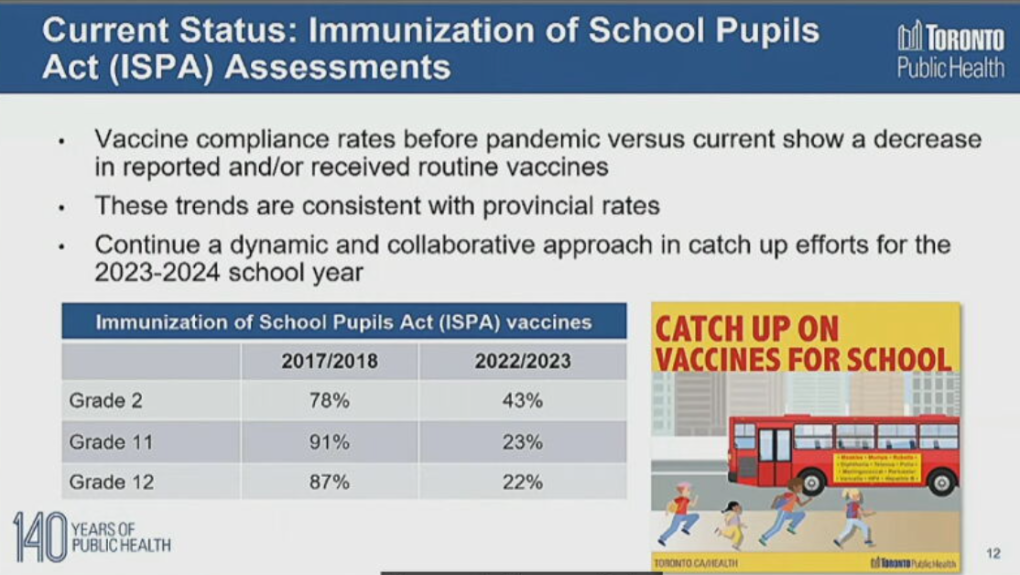'Massive human cost': Only 22% of Grade 12 students have routine vaccines, TPH finds
Just over 20 per cent of the oldest high school students in the city have routine vaccines, compared to nearly 90 per cent immunization levels pre-pandemic, according to Toronto Public Health.
The statistics were presented at a Toronto Public Health (TPH) meeting on Monday and account for routine vaccines – Measles, Mumps, Rubella, Diphtheria, Meningococcal, Tetanus, Polio, Pertussis and Chicken pox.
Almost 80 per cent of Grade 2 students were vaccinated in 2017/ 2018 compared to 43 per cent in 2022/ 2023.
Meanwhile, 91 per cent of Grade 11 students and 87 per cent of Grade 12 students had routine vaccines pre-pandemic, compared to 23 per cent and 22 per cent, respectively, in recent years.
TPH has been working to get back on track since June 2022, with more than 114,000 vaccines administered last year, Associate Medical Officer of Health Dr. Vinita Dubey said.
“Despite these tremendous efforts for catch up, our vaccination rates post-pandemic are lower compared to before the pandemic,” she added.
These lower rates of vaccine uptake are of concern, but the real impact is in the risk of cohorts of students unprotected from preventive diseases, Dr. Milena Forte, a family physician at Mount Sinai Hospital, explained. “These kids are at risk themselves and will put others at risk,” she said.
There are several central reasons for this dramatic decrease, Dubey explained. In some cases, students are vaccinated but have not reported their immunization, while in others, children could not access primary care providers during the pandemic. She pointed to the "three Cs" – convenience, confidence and complacency – that ultimately result in vaccination delays and hesitancy.
At the meeting, City Councillor Alejandra Bravo asked what the population-level impact of this “crisis” in vaccination levels could be. “I’m sure you’d agree there would be a massive human cost if these kinds of diseases started spreading in the human population,” she said.
“If Toronto’s vaccine rates drop even 10 per cent for measles, it could result in outbreaks within the city,” Dubey said in response.
 A Toronto Public Health slide showing a decrease in vaccine coverage presented on Sept. 11, 2023.
A Toronto Public Health slide showing a decrease in vaccine coverage presented on Sept. 11, 2023.
Forte also pointed to the dip in immunization coverage of Hepatitis B, Human Papillomavirus (HPV) and Meningococcal, typically administered at school-based programs, but placed on pause during the pandemic.
“In the case of HPV, the risk is an increase in rates of cervical and oral cancers which we won't see for another 10, 15 years,” she said.
The approach to filling the immunization gap is multifactorial, and encompasses the government and public health working together to educate and find those who have fallen through the cracks, Forte said.
“The number one thing that comes up is that we need a uniform, streamlined provincial registry like we had for COVID,” she said.
CTVNews.ca Top Stories

Ministers Joly, LeBlanc travel to Florida to meet with Trump's team
Two members of Prime Minister Justin Trudeau's cabinet will be in Palm Beach, Fla., Friday to meet with members of Donald Trump's team.
India alleges widespread trafficking of international students through Canada to U.S.
Indian law enforcement agencies say they are investigating alleged links between dozens of colleges in Canada and two 'entities' in Mumbai accused of illegally ferrying students across the Canada-United States border.
Teen actor Hudson Meek, who appeared in 'Baby Driver,' dies after falling from moving vehicle
Hudson Meek, the 16-year-old actor who appeared in 'Baby Driver,' died last week after falling from a moving vehicle in Vestavia Hills, Alabama, according to CNN affiliate WVTM.
Aviation experts say Russia's air defence fire likely caused Azerbaijan plane crash as nation mourns
Aviation experts said Thursday that Russian air defence fire was likely responsible for the Azerbaijani plane crash the day before that killed 38 people and left all 29 survivors injured.
Police identify victim of Christmas Day homicide in Hintonburg, charge suspect
The Ottawa Police Service says the victim who had been killed on Christmas Day in Hintonburg has been identified.
Pizza deliverer in Florida charged with stabbing pregnant woman at motel after tip dispute
A pizza deliverer in central Florida has been charged with pushing her way into a motel room with an accomplice and stabbing a pregnant woman after a dispute over a tip, authorities said.
Unwanted gift card in your stocking? Don't let it go to waste
Gift cards can be a quick and easy present for those who don't know what to buy and offer the recipient a chance to pick out something nice for themselves, but sometimes they can still miss the mark.
Cat food that caused bird-flu death of Oregon pet was distributed in B.C.: officials
Pet food contaminated with bird flu – which killed a house cat in Oregon – was distributed and sold in British Columbia, according to officials south of the border.
Raised in Sask. after his family fled Hungary, this man spent decades spying on communists for the RCMP
As a Communist Party member in Calgary in the early 1940s, Frank Hadesbeck performed clerical work at the party office, printed leaflets and sold books.

































